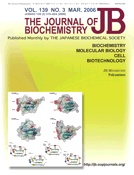-
Views
-
Cite
Cite
Masao Kawakita, Kyoko Hiramatsu, Diacetylated Derivatives of Spermine and Spermidine as Novel Promising Tumor Markers, The Journal of Biochemistry, Volume 139, Issue 3, March 2006, Pages 315–322, https://doi.org/10.1093/jb/mvj068
Close - Share Icon Share
Abstract
N1,N12-diacetylspermine (DiAcSpm) and N1,N8-diacetylspermidine (DiAcSpd) are minor components of human urinary polyamine to which little attention has been paid until recently. HPLC analysis of urinary polyamines has revealed that the excretion of these diacetylpolyamines, in particular, into urine was frequently and markedly increased in association with every type of cancer so far examined. Remission was usually accompanied by recovery of urinary diacetylpolyamines to the normal level. DiAcSpm was more sensitive than CEA for detecting colorectal cancer patients, while DiAcSpd was highly specific for malignant conditions in that the excretion of the latter was scarcely elevated in cases of benign urogenital diseases. An ELISA procedure for rapid determination of DiAcSpm was developed to promote the clinical application of these new tumor markers, and subsequent studies indicated that DiAcSpm was elevated in 60% of colorectal cancer patients at early stages (stage 0 + I), whereas only 10% of these patients were CEA-positive. DiAcSpm may also be useful as a follow-up marker that is efficient for detecting recurrence and sensitive to changes in the clinical condition of patients. The evidence accumulated so far indicates that DiAcSpm and DiAcSpd are promising novel tumor markers. They deserve more intensive studies, including studies of their biochemistry and metabolism.





